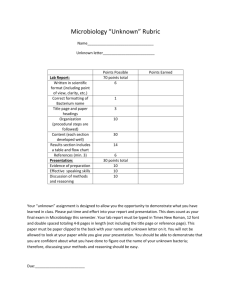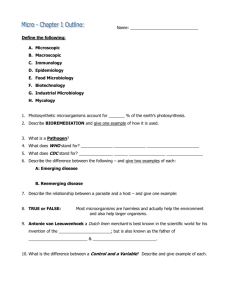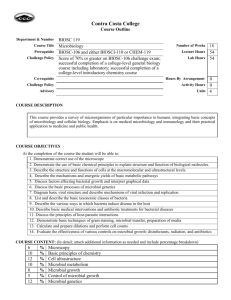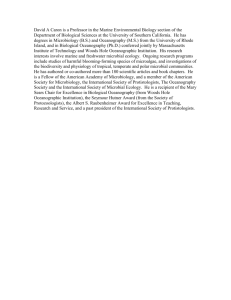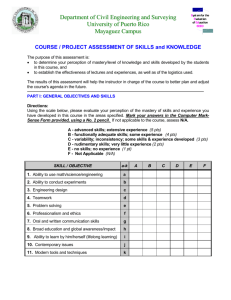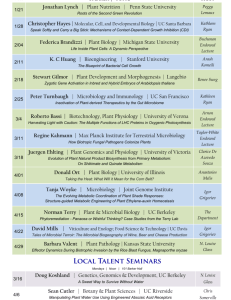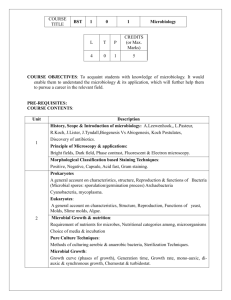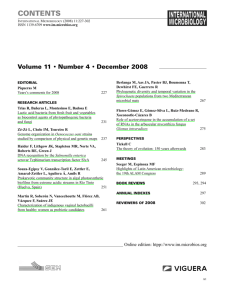Lecture Syllabus for General Microbiology
advertisement
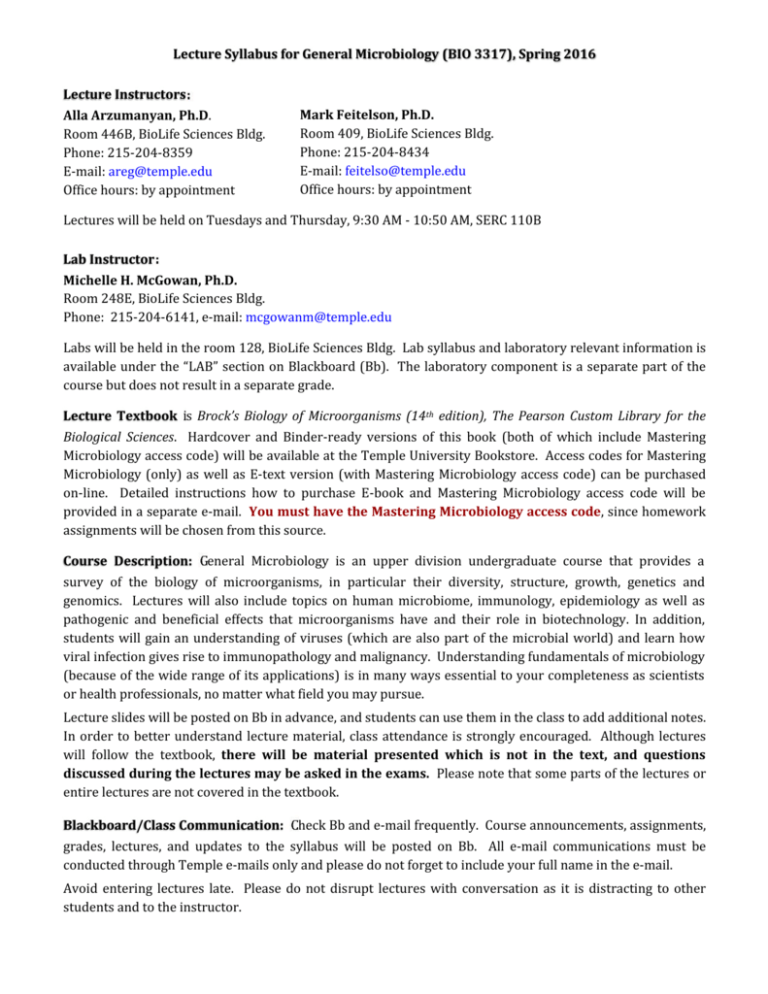
Lecture Syllabus for General Microbiology (BIO 3317), Spring 2016 Lecture Instructors: Alla Arzumanyan, Ph.D. Room 446B, BioLife Sciences Bldg. Phone: 215-204-8359 E-mail: areg@temple.edu Office hours: by appointment Mark Feitelson, Ph.D. Room 409, BioLife Sciences Bldg. Phone: 215-204-8434 E-mail: feitelso@temple.edu Office hours: by appointment Lectures will be held on Tuesdays and Thursday, 9:30 AM - 10:50 AM, SERC 110B Lab Instructor: Michelle H. McGowan, Ph.D. Room 248E, BioLife Sciences Bldg. Phone: 215-204-6141, e-mail: mcgowanm@temple.edu Labs will be held in the room 128, BioLife Sciences Bldg. Lab syllabus and laboratory relevant information is available under the “LAB” section on Blackboard (Bb). The laboratory component is a separate part of the course but does not result in a separate grade. Lecture Textbook is Brock’s Biology of Microorganisms (14th edition), The Pearson Custom Library for the Biological Sciences. Hardcover and Binder-ready versions of this book (both of which include Mastering Microbiology access code) will be available at the Temple University Bookstore. Access codes for Mastering Microbiology (only) as well as E-text version (with Mastering Microbiology access code) can be purchased on-line. Detailed instructions how to purchase E-book and Mastering Microbiology access code will be provided in a separate e-mail. You must have the Mastering Microbiology access code, since homework assignments will be chosen from this source. Course Description: General Microbiology is an upper division undergraduate course that provides a survey of the biology of microorganisms, in particular their diversity, structure, growth, genetics and genomics. Lectures will also include topics on human microbiome, immunology, epidemiology as well as pathogenic and beneficial effects that microorganisms have and their role in biotechnology. In addition, students will gain an understanding of viruses (which are also part of the microbial world) and learn how viral infection gives rise to immunopathology and malignancy. Understanding fundamentals of microbiology (because of the wide range of its applications) is in many ways essential to your completeness as scientists or health professionals, no matter what field you may pursue. Lecture slides will be posted on Bb in advance, and students can use them in the class to add additional notes. In order to better understand lecture material, class attendance is strongly encouraged. Although lectures will follow the textbook, there will be material presented which is not in the text, and questions discussed during the lectures may be asked in the exams. Please note that some parts of the lectures or entire lectures are not covered in the textbook. Blackboard/Class Communication: Check Bb and e-mail frequently. Course announcements, assignments, grades, lectures, and updates to the syllabus will be posted on Bb. All e-mail communications must be conducted through Temple e-mails only and please do not forget to include your full name in the e-mail. Avoid entering lectures late. Please do not disrupt lectures with conversation as it is distracting to other students and to the instructor. Cell phones must be off during class! A student who engages in text messaging or cell phone calls during lecture will be asked to leave the lecture room. Certainly, you are always welcome to ask questions about material that is being presented, to talk about your performance, study habits or ask advice on how to become a better exam taker. Please do not wait until the end of the semester to express your concerns: this may have a large impact upon your performance. Grading: Grades will be based on the following criteria 1. Homework (HW) assignments will consist of multiple-choice/art-activity questions covering material discussed in the previous lectures and chosen from the Mastering Microbiology source. Please note that each HW has assigned due date and time: if you miss the deadline, submission will not be possible, and your missed HW will be graded “zero.” 2. Each midterm examinations will consist of two parts: multiple-choice (70%) and one short answer (30%) questions. The last exam is not comprehensive. Students are expected to take exams at the designated date and time. Make-up exams will be allowed only in the case of serious illness or personal issues, and written documentation supporting the request is required. If you have three final exams scheduled for the same day, please contact me to discuss alternative arrangements to take exam. If you disagree about your grade for a particular question, you should compose a written explanation based on reliable scientific evidence and email me within two days after exam is returned. 3. Laboratory grade will be a sum of the grades for several quizzes, worksheets, article evaluation, lab technique, notebook and cumulative practical exam (details are presented in the Lab Syllabus). Point breakdown (maybe subject to change): Four (4) exams, 100 pts./exam Twelve (12) HW assignments, 20 pts./HW Laboratory Total: 400 pts. 220 pts. 300 pts. 920 pts. Final grades will be awarded based upon the achievement of each student and assigned on a straight scale using the following weights: 100 - 90% pts.: (A and A-) 89 - 78% pts.: (B+, B and B-) 77 - 67% pts.: (C+, C and C-) 66 - 58% pts.: (D), and 57% pts. (and below): (F) Student and Faculty Academic Rights and Responsibilities Policy: Temple University has a policy on Student and Faculty Academic Rights and Responsibilities (Policy #03.70.02) that can be accessed through the link http://policies.temple.edu/getdoc.asp?policy_no=03.70.02 Disability Disclosure: Student who needs accommodation based on the impact of a disability should contact me A.S.A.P. The Office of Disability Resources and Services (DSR) will coordinate accommodations and make arrangements for extended time to take exams. DSR contact information: 1301 Cecil B. Moore Avenue, Philadelphia, PA 19122; phone: 215-204-1280; e-mail: drs@temple.edu. Finally, we will make every effort to help you learn, enjoy (!) and appreciate microbiology, but you must also study and efficiently utilize available resources to acquire both understanding and professional skills at a high academic standard that will be important for this class and your future success. BIO3317 Lecture SHEDULE, Spring 2016 (maybe subject to change) 1. Jan. 12 (Tu). Ch. 1. Microorganisms and Microbiology, also sections 12.1-12.3 from Ch.12 (Early Earth and the Origin and Diversification of Life, pp. 348-354). 2. Jan. 14 (Th). Ch. 2. Microbial Cell Structure and Function. 3. Jan. 19 (Tu). Ch. 3. Microbial Metabolism, also sections 13.6 (p. 393), 13.12 (p. 402) and 13.16 (p. 410) from Ch. 13 (Metabolic Diversity of Microorganisms). 4. Jan. 21 (Th). Ch. 5. Microbial Growth and Growth control. 5. Jan. 26 (Tu). Ch. 4. Molecular Microbiology. 6. Jan. 28 (Th). Ch. 6. Microbial Genomics. 7. Feb. 2 (Tu). Ch. 10. Genetics of Bacteria. 8. Feb. 4 (Th). Ch. 11. Genetic Engineering and Biotechnology. Midterm Exam 1 (Lectures 1-8), Feb. 9 (Tu) 9. 10. 11. 12. 13. Feb. 11 (Th). Feb. 16 (Tu). Feb. 18 (Th). Feb. 23 (Tu). Feb. 25 (Th). Ch. 8. Viruses and Virology (Dr. Feitelson). Ch. 9. Viral Genomes and Diversity (Dr. Feitelson). Viruses as Etiologic Agents of Cancer (Dr. Feitelson). Ch. 22 (III). Mammal as Microbial Habitats. Gut Microbiome (Dr. Feitelson). Ch. 23. Microbial Interactions with Humans, also section 7.9 (p. 228) from Ch. 7 (Quorum Sensing). Feb. 29 (Mon) – Mar. 6 (Sun): Spring Break Midterm Exam 2 (Lectures 9-13), Mar. 8 (Tu) 14. 15. 16. 17. 18. Mar. 10 (Tu). Mar. 15 (Tu). Mar. 17 (Th). Mar. 22 (Tu). Mar. 24 (Th). Ch. 24 and 25. Immunity and Host Defense. Immune Mechanisms. Ch. 26. Molecular Immunology. Viral immunopathology (Dr. Feitelson). Ch. 27. Diagnostic Microbiology. Ch. 28. Epidemiology. 19. 20. 21. 22. 23. 24. 25. Mar 31 (Th). Apr. 5 (Tu). Apr. 7 (Th). Apr. 12 (Tu). Apr. 14 (Th). Apr. 19 (Tu). Apr 21 (Th). Ch. 29. Ch. 30. Ch. 31. Ch. 32. Ch. 18. Ch. 19. Ch. 20. Midterm Exam 3 (Lectures 14-18), Mar. 29 (Tu) Person-to-Person Bacterial and Viral Diseases. Vector-borne and Soil-borne Bacterial and Viral Diseases. Water and Food as Vehicles of Bacterial Diseases. Eukaryotic Pathogens: Fungal and Parasitic Diseases. Methods in Microbial Ecology. Microbial Ecosystems. Nutrient Cycles. Apr. 26 (Tu). Study day Midterm Exam 4 (Lectures 19-25), Apr. 28 (Th) (8-10 AM in SERC, 110B)
